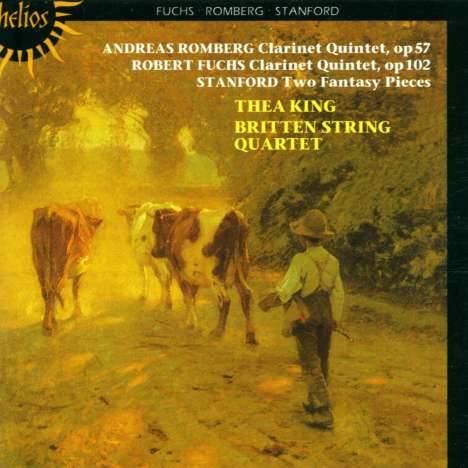Thea King spielt Klarinettenquintette auf CD
Thea King spielt Klarinettenquintette
Herkömmliche CD, die mit allen CD-Playern und Computerlaufwerken, aber auch mit den meisten SACD- oder Multiplayern abspielbar ist.
Lassen Sie sich über unseren eCourier benachrichtigen, falls das Produkt bestellt werden kann.
A. Romberg: Klarinettenquintett op. 57
+R. Fuchs: Klarinettenquintett op. 102
+Stanford: Two Fantasy Pieces
Ähnliche Artikel
Im fast undenkbaren Zeitalter der Anmut, das die Menschheit vor Anbruch des zwanzigsten Jahrhunderts—vor Atonalität und Atombombe—erleben durfte, dachten nur wenige Komponisten an die Klarinette und ihre höheren Register, und die hohe Pikkolo-Klarinette (in Es) war ausser in der Militärkapelle praktisch unbekannt. Schrillheit galt als verpönt und unzivilisiert. Mozart, Weber, Brahms, Reger—und geringere (jedoch nicht mittelmässige) Leuchten wie Romberg, Fuchs und Stanford—bevorzugten jedoch die Klarinette für ihre lyrische, wohlklingende Qualität, ihre Wärme im Ausdruck, ihre tiefe, ausgedehnte Klangpalette. Bis das Saxophon erfunden war, simulierte die Klarinette von allen Holzblasinstrumenten am ehesten die menschliche Stimme und mit ihrer ausserordentlichen Fähigkeit der dynamischen Kontrolle, besonders die des diminuendos und pianissimos, kann sie sich so unter andere Instrumente (Streicher und Bläser) mischen, als gehöre sie zur gleichen Familie. Ein anderer Vorzug ist, dass sich das menschliche Ohr viel weniger an der Klarinette satt hört als an irgendeinem anderen Blasinstrument. Das bedeutet, das vorliegende Konzert von Thea King ist bis zum Ende (die Werke sind in chronologischer Reihenfolge angeordnet) keine Strafe, sondern eine helle Freude.
Product-Information:
In that unthinkable Age of Grace enjoyed by all mankind before the dawning of the twentieth century—before atonality and the H-Bomb—few composers thought of writing for the clarinet in the upper part of its register, and the high piccolo clarinet (in E flat) was practically unknown outside the military band. Stridency was uncivilized. Mozart, Weber, Brahms, Reger—and lesser (but not undistinguished) luminaries like Romberg, Fuchs and Stanford—all favoured the clarinet for its lyrical, euphonious quality, its rich warmth of expression, and its deep broad range of tone colours. Until the saxophone was invented, the clarinet, of all the woodwind instruments, most nearly approximated to the human voice, and its extraordinary powers of dynamic control, especially in diminuendo and pianissimo, enable it to blend with other instruments (both strings and brass) as if it were one of the family. Another asset is the fact that the ear tires of the clarinet much less readily than any other wind instrument, so that listening to Thea King’s present recital right the way through (the works are presented in chronological order) is not a penance but a pleasure.
Rezensionen
'These are diversions – divertimenti – in the best sense of the word. There’s plenty of lively, affectionate musicianship in these performances – all warmly and intimately recorded' (BBC Music Magazine)
'Easygoing, tuneful and very likeable … there’s plenty of lively, affectionate musicianship in these performances – all warmly and intimately recorded' (www. musicweb)
Disk 1 von 1 (CD)
Quintett für Klarinette und Streichquartett Es-Dur op. 57
-
1 1. Allegro
-
2 2. Menuetto: Allegretto
-
3 3. Larghetto
-
4 4. Finale: Allegro vivace
Quintett für Klarinette und Streichquartett Es-Dur oop. 102
-
5 1. Allegro molto moderato
-
6 2. Allegro scherzando
-
7 3. Andante sostenuto
-
8 4. Allegretto grazioso
Zwei Fantasien für Klarinette und Streichquartett Nr. 1 g-moll
-
9 1. Allegro moderato (alla Marcia) - Andante - Allegro
-
10 2. Allegro piacevole - Adagio - Quasi presto - Tempo primo
Mehr von Andreas Romberg
-
Andreas RombergSymphonien Nr.1 & 3CDVorheriger Preis EUR 17,99, reduziert um 0%Aktueller Preis: EUR 7,99
-
Andreas RombergSymphonie Nr.4 op.51 "Alla Turca"CDVorheriger Preis EUR 17,99, reduziert um 0%Aktueller Preis: EUR 7,99
-
Andreas RombergDer MessiasCDAktueller Preis: EUR 7,99
-
Andreas RombergStreichquartette Vol.1CDAktueller Preis: EUR 19,99









